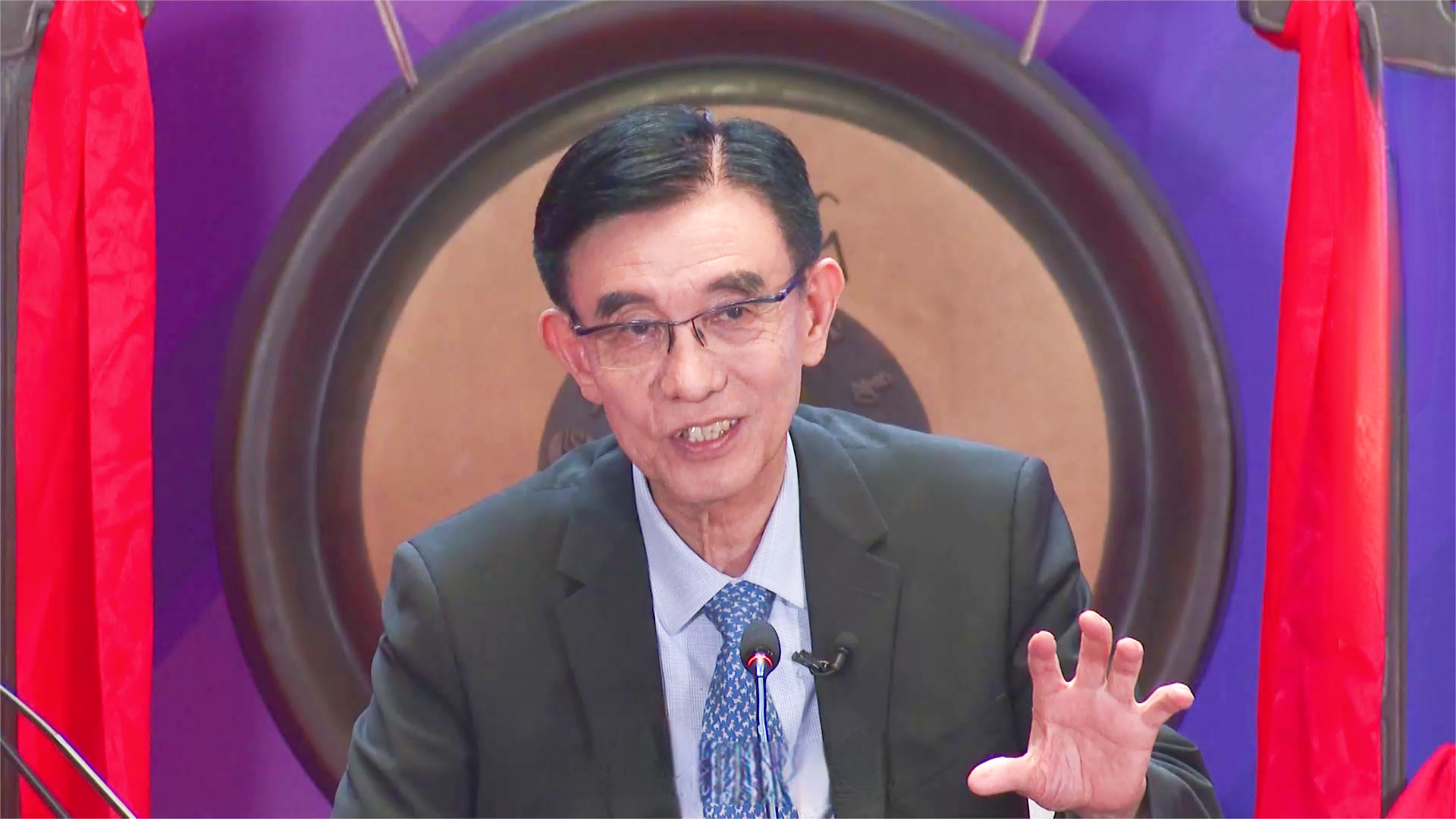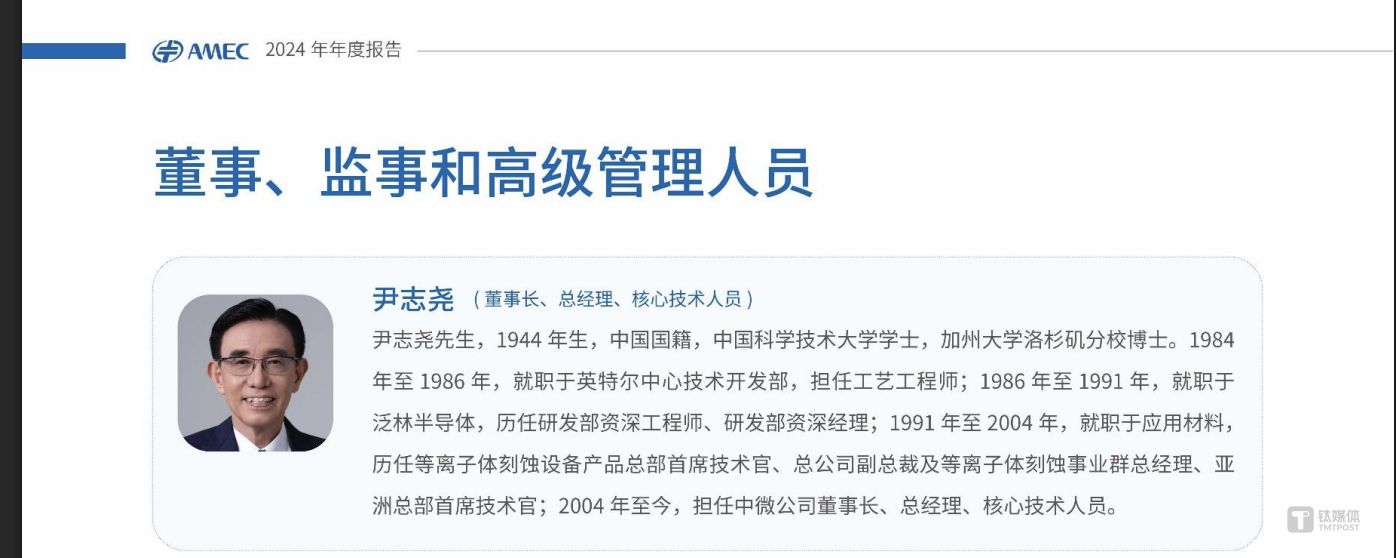
Yin Zhiyao, founder and chairman of AMEC (Image source: CNR).
On April 19, titanium media silicon-based world learned that according to the annual report released by China Micro Corporation (SHA: 688012) on Friday, Yin Zhiyao, founder, chairman and CEO of China Micro Semiconductor, has given up his American citizenship and resumed his Chinese citizenship.

Born in 1944, Yin Zhiyao holds a bachelor's degree from the University of Science and Technology of China and a Ph.D. from the University of California, Los Angeles. From 1984 to 1986, he worked as a process engineer in the Technology Development Department of Intel Center. From 1986 to 1991, he worked at Lam Research, successively serving as a senior engineer in the R&D department and a senior manager in the R&D department. From 1991 to 2004, he worked at Applied Materials, Inc., successively serving as Chief Technology Officer of the Plasma Etching Equipment Product Division, Vice President of the Head Office, General Manager of the Plasma Etching Business Group, and Chief Technology Officer of the Asia Headquarters.
Founded in 2004 by Yin Zhiyao, AMEC is a major supplier of etching and deposition tools in China and one of the leading enterprises in the field of semiconductor equipment in China. According to the financial report, since 2004, Yin Zhiyao has served as the chairman, general manager and core technical personnel of AMEC.
It is understood that when he founded AMEC, Yin Zhiyao has always been an American citizen. According to the 2022 annual report released by AMEC, he is still a US citizen, and in the 2023 annual report, AMEC did not disclose Yin Zhiyao's nationality. Now in the 2024 annual report, Yin Zhiyao's nationality has been changed, giving up his American nationality and restoring his Chinese nationality.
As for the specific reason why Yin Zhiyao gave up his American citizenship and regained his Chinese nationality, AMEC did not disclose more details in the financial report, but there is widespread speculation in the industry that it may be related to the "American" clause in the previous US Department of Commerce's export control measures against China.
On October 7, 2022, the U.S. Department of Commerce announced a series of semiconductor export control measures to China, including that "U.S. persons" may not provide support to certain entities engaged in the development or production of integrated circuits in semiconductor manufacturing "facilities" in China without a license.
In August 2023, AMEC announced that due to work adjustments, the company's three American core technical personnel, Du Zhiyou, Mai Shiyi, and Li Tianxiao, will no longer participate in the research and development of the company's core technology, so they will no longer be recognized as the company's core technical personnel, but they will continue to work in the company. At the same time, Cong Hai, Tao Heng, Jiang Yong, Chen Huanglin, Liu Zhiqiang, and He Weiye were added as the company's core technical personnel.
In September 2024, AMEC announced again that the board of directors recently received written resignation reports submitted by two other American core technical personnel, Ni Tuqiang and Yang Wei. Ni Tuqiang applied for resignation from the position of deputy general manager and core technical personnel of the company due to personal reasons. Yang Wei applied for resignation from the company's core technical personnel due to personal reasons. After the resignation, Ni Tuqiang and Yang Wei are still working in the company.
At the time, AMEC said their departure "will not have a material adverse impact on the company's R&D progress, operational capability or competitiveness."
According to the latest annual report, in 2024, AMEC will achieve revenue of 9.065 billion yuan, a year-on-year increase of 44.7%, of which etching equipment will contribute more than 7.2 billion yuan, a year-on-year increase of 54.7%, ranking firmly in the leading domestic etching equipment. Over the past four years, AMEC's revenue has grown at a compound annual growth rate of more than 40%.
However, in 2024, the net profit of AMEC will be about 1.616 billion yuan, a year-on-year decrease of 9.5%, mainly affected by the surge in R&D investment (R&D expenses of 2.45 billion yuan, a year-on-year increase of 94.3%), and the non-net profit will be about 1.388 billion yuan, an increase of 16.5%.
AMEC says its R&D process for new products has accelerated significantly, which previously typically took three to five years. The company noted it took less than two years to develop a "competitive" new device and "well" commercialise it.
In addition to announcing the annual report, on April 18, AMEC also announced that its subsidiary of AMEC Semiconductor Equipment (Shanghai) Co., Ltd. (hereinafter referred to as AMEC), which develops electron beam testing equipment, plans to increase its capital and introduce new shareholders, with a registered capital of 160 million yuan after the completion of the capital increase.
In this capital increase, AMEC plans to increase the subscribed registered capital of 50 million yuan; Zhonghuan Partnership plans to increase the subscribed registered capital of 13.12 million yuan; Yin Zhiyao plans to subscribe to an additional registered capital of 10 million yuan; BEAMVISION plans to subscribe an additional registered capital of 6.53 million yuan. At the same time, Supermicro plans to introduce new natural person shareholders Chen Weiwen, Jiaxing Minghu Xinju Enterprise Management Partnership (Limited Partnership) and Jiaxing Huguang Tongxin Enterprise Management Partnership (Limited Partnership). After the completion of this capital increase and the corresponding equity incentive, AMEC's shareholding in Supermicro will drop to 47.2%.
This is the second time that Yin Zhiyao's team has increased the capital of Supermicro in less than half a year.
Yin Zhiyao said earlier that in the next step, the company will accelerate the development of electron beam detection equipment to make up for the shortcomings of the industry. At present, the independent controllability rate of major domestic components has reached more than 90%, and it can reach 100% by the end of the third quarter of 2024. In the field of semiconductor equipment, China is still far from the most advanced level in the world, but it is believed that in another 5-10 years, the goal of reaching the most advanced level in the world can be fully realized.
"I don't see the limits in the entire semiconductor equipment industry, and there is no hurdle that I can't overcome technically. You still have to grit your teeth and do it patiently step by step, and you will definitely be able to do it well. Yin Zhiyao said.
(Author: Lin Zhijia).
Ticker Name
Percentage Change
Inclusion Date